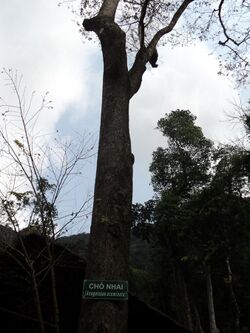Biology:Anogeissus acuminata
| Anogeissus acuminata | |
|---|---|

| |
| Scientific classification | |
| Kingdom: | Plantae |
| Clade: | Tracheophytes |
| Clade: | Angiosperms |
| Clade: | Eudicots |
| Clade: | Rosids |
| Order: | Myrtales |
| Family: | Combretaceae |
| Genus: | Anogeissus |
| Species: | A. acuminata
|
| Binomial name | |
| Anogeissus acuminata (Roxb. ex Candolle) Guillemin et al.[1]
| |
| Synonyms | |
|
Conocarpus lanceolatus Heyne ex Wall. | |
Anogeissus acuminata is a species of tree in the Combretaceae and has been called axlewood,[citation needed] buttontree[2] or Burmese-derived yon[3] (Template:Lang-my-name-MLCTS; IPA: [jṍʷ]) in English. It is now considered a synonym of Terminalia phillyreifolia (see #Taxonomy).
A medium-sized tree found in both primary and secondary tropical and sub-tropical forests, it may be one of the dominant species of deciduous forests of Vietnam;[4] it is recorded from the rest of Indochina, Bangladesh, India , Myanmar and Yunnan in China. In Yunnan it is found in rocky limestone areas, near sea level to 700 m.[5]
Besides timber uses, the bark of this species has a high tannin content.
Taxonomy
Reference has been made to the varieties:[6]
- A. a. var. fischeri (M.G.Gangop. & Chakrab.) M.G.Gangop. & Chakrab.,
- A. a. var. lanceolata Wall. ex C.B.Clarke occurring from India to Vietnam,
- A. a. var. phillyreifolia (Van Heurck & Müller Argoviensis) Kurz, is "apparently restricted to Myanmar".
Plants of the World Online now refers to this species as a synonym of Terminalia phillyreifolia (Van Heurck & Müll.Arg.) Gere & Boatwr.[7] per an article published in 2017, with some genera including Anogeissus embedded into Terminalia.[8]
Description
In China, trees grow to 20 m tall, with a trunk to 1 m d.b.h.; elsewhere (Myanmar) they may be larger: up to 30 m tall and up to 2.4 or even 2.7 m girth, with a straight and cylindrical trunk.[9] Branchlets slightly pendent, slender, together with petioles and leaf blades golden villous when young. Petioles are cylindrical, 2–6 mm; leaf blades are lanceolate to narrowly so, 40-80 × 10–30 mm, abaxially grey-green and pilose mostly in axils of lateral veins, adaxially green and glabrous to glabrescent, base narrowed or obtuse, apex acuminate; lateral veins in 5-7 pairs, inconspicuous.
Flowers are numerous sessile on flower heads 9–13 mm in diameter; bracts are easily deciduous and linear, 4–5 mm long. Calyx tubes are approximately 5 mm long, abaxially yellow pubescent, densely so on ovary and tubular part, more sparsely so on cup-shaped part. Filaments 3–4 mm. Fruits are approximately 6 × 5 mm including a 'beak', ferruginous pubescent distally and on beak. Flowering is from February–March in Bangladesh and Thailand.
Vernacular names
Common names for A. acuminata[10] include:
- Bengali: Itchri
- Burmese: ရုံး (yon)
- Chinese: 榆绿木 (yu lü mu)
- Hindi: Dhau, Dhoy, धौरा Dhaura
- Malayalam: Panchman, Vekkali
- Tamil: நுந்நெரா Nunnera
- Telugu: Bu-chakaram, Pasi Chettu, Pedda Manu(ailanthus excelsa)
- Thai: ตะเคียนหนู
- Urdu: Pasi
- Vietnamese: Chò nhai (Râm, Xoi)
References
- ↑ Guillemin JBA, Perrottet GS, Leprieur FMR, Richard A (1832) Florae Senegambiae tentamen. Tomus primus: seu Historia plantarum in diversis Senegambiae regionibus a peregrinatoribus Perrottet et Leprieur detectarum 1: 280.
- ↑ Quattrocchi, Umberto (2012). CRC World Dictionary of Medicinal and Poisonous Plants: Common Names, Scientific Names, Eponyms, Synonyms, and Etymology. Boca Raton and London and New York: CRC Press. p. 314. ISBN 978-1-4822-5064-0. https://books.google.co.jp/books?id=-37OBQAAQBAJ&pg=PA314&dq=Anogeissus+acuminata+buttontree&hl=en&sa=X&ved=0ahUKEwjgp57u5IDmAhUUHXAKHbK_CqIQ6AEIPTAC#v=onepage&q=Anogeissus%20acuminata%20buttontree&f=false.
- ↑ Trotter, H. (1941). The common commercial timbers of India and their uses. Delhi: Manager of Publications. p. 45. https://books.google.co.jp/books?hl=en&id=DYZtAAAAIAAJ&dq=Anogeissus+acuminata+common&focus=searchwithinvolume&q=yon.
- ↑ Blanc L, Maury-Lechon G, Pascal J-P (2000) Structure, floristic composition and natural regeneration in the forests of Cat Tien National Park, Vietnam: an analysis of the successional trends. Journal of Biogeography, 27: 141–157.
- ↑ Flora of China 13: 314. 2007
- ↑ Roskov Y.; Kunze T. (2014). "Species 2000 & ITIS Catalogue of Life: 2014 Annual Checklist.". in Didžiulis V.. Species 2000: Reading, UK.. http://www.catalogueoflife.org/annual-checklist/2014/details/species/id/16813327. Retrieved 24 September 2018.
- ↑ POWO: Anogeissus acuminata (Roxb. ex DC.) Wall. ex Guill. & Perr. (retrieved 24 September 2018)
- ↑ Maurin, Olivier; Gere, Jephris; van Der Bank, Michelle; Boatwright, James Stephen (2017). "The inclusion of Anogeissus, Buchenavia and Pteleopsis in Terminalia (Combretaceae: Terminaliinae)". Botanical Journal of the Linnean Society 184 (3): 312–325. doi:10.1093/botlinnean/box029.
- ↑ ITTO Tropical Forest News [1] (accessed 27/12/2016)
- ↑ EOL [2] (accessed on 26/12/2016)
External links
- {{citation
| mode = cs1 | title = Anogeissus acuminata | work = Germplasm Resources Information Network (GRIN) | url = | publisher = [[Organization:Agricultural Research ServAgricultural Research Service (ARS), United States Department of Agriculture (USDA) | access-date = }}
Wikidata ☰ Q11120322 entry

